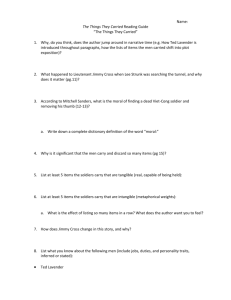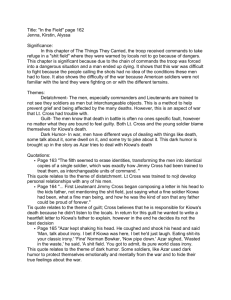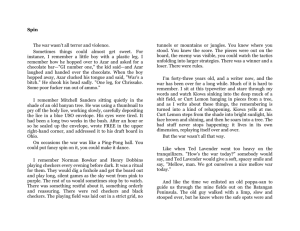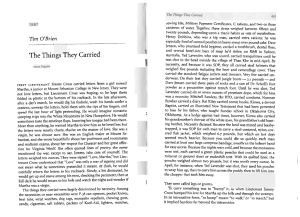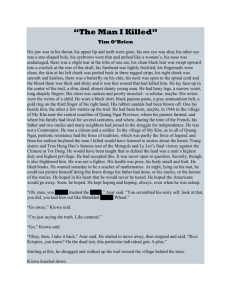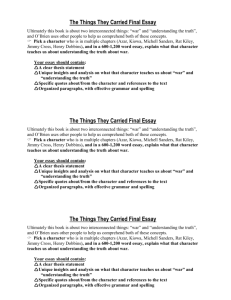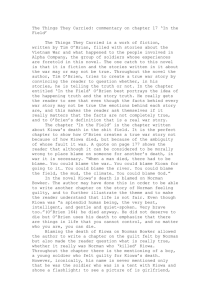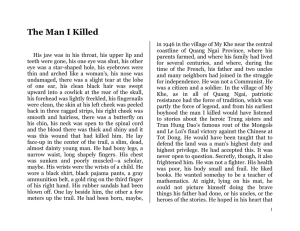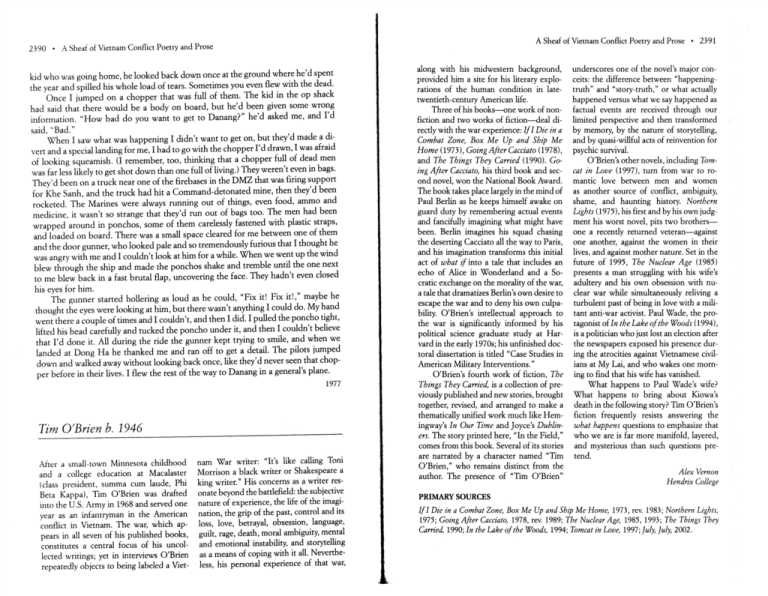
A Sheaf of Vietnam Conflict Poetry and Prose • 2391
2390 • A Sheaf of Vietnam Conflict Poetry and Prose
kid who was going horne, he looked back down once at the ground where he'd spent
the year and spilled his whole load of tears. Sometimes you even flew with the dead.
Once I jumped on a chopper that was full of them. The kid in the op shack
had said that there would be a body on board, but he'd been given some wrong
information. "How bad do you want to get to Danang?" he'd asked me, and I'd
said, Bad."
When I saw what was happening I didn't want to get on, but they'd made a divert and a special landing for me, 1 had to go with the chopper 1'd drawn, I was afraid
of looking squeamish. (1 remember, too, thinking that a chopper full of dead men
\vas far less likely to get shot down than one full of living.) They weren't even in bags.
They'd been on a truck near one of the firebases in the DMZ that was firing support
for Khe Sanh, and the truck had hit a Command-detonated mine, then they'd been
rocketed. The Marines were always running out of things, even food, ammo and
medicine, it wasn't so strange that they'd run out of bags too. The men had been
wrapp~d around in ponchos, some of them carelessly fastened with plastic straps,
and loaded on board. There was a small space cleared for me between one of them
and the door gunner, who looked pale and so tremendously furious that I thought he
was angry with me and I couldn't look at him for a while. When we went up the wind
blew through the ship and made the ponchos shake and tremble until the one next
to me blew back in a fast brutal flap, uncovering the face. They hadn't even closed
his eyes for him.
The gunner started hollering as loud as he could, "Fix it! Fix it!," maybe he
thought the eyes were looking at him, but there wasn't anything I could do. My hand
went there a couple of times and I couldn't, and then I did'. I pulled the poncho tight,
lifted his head carefully and tucked the poncho under it, and then I couldn't believe
that I'd done it. All during the ride the gunner kept trying to smile, and when we
landed at Dong Ha he thanked me and ran off to get a detail. The pilots jumped
down and walked away without looking back once, like they'd never seen that chopper before in their lives. I flew the rest of the way to Danang in a general's plane.
H
1977
Tim OJBrien b. 1946
After a small-town Minnesota childhood
and a college education at Macalaster
(class president, summa cum laude, Phi
Beta Kappa), Tim O'Brien was drafted
into the U.S. Army in 1968 and served one
year as an infantryman in the American
conHict in Vietnam. The war, which appears in all seven of his published books,
constitutes a central focus of his uncollected \vritings; yet in interviews O'Brien
repeatedly objects to being labeled a Viet-
nam War writer: "It's like calling Toni
Morrison a black writer or Shakespeare a
king writer." His concerns as a writer resonate beyond the battlefield: the subjective
nature of experience, the life of the imagination, the grip of the past, control and its
loss, love, betrayal, obsession, language,
guilt, rage, death, moral ambiguity, mental
and emotional instability, and storytelling
as a means of coping with it all. Nevertheless, his personal experience of that war,
along with his midwestern background,
provided him a site for his literary explorations of the human condition in latetwentieth-century American life.
Three of his books-one work of nonfiction and two works of fiction-deal direcdy with the war experience: I/I Die in a
Combat Zone) Box Me Up and Ship Me
Home (1973), GoingA/terCacciato (1978),
and The Things They Carried (1990). Going A/ter Cacciato) his third book and second novel, won the National Book Award.
The book takes place largely in the mind of
Paul Berlin as he keeps himself awake on
guard duty by remembering actual events
and fancifully imagining what might have
been. Berlin imagines his squad chasing
the deserting Cacciato all the way to Paris,
and his imagination transforms this initial
act of what 1/ into a tale that includes an
echo of Alice· in Wonderland and a Socratic exchange on the morality of the war,
a tale that dramatizes Berlin's own desire to
escape the war and to deny his own culpability. O'Brien's intellectual approach to
the war is significantly informed by his
political science graduate study at Harvard in the early 1970s; his unfinished doctoral dissertation is titled "Case Studies in
American Military Interventions. "
O'Brien's fourth work of fiction, The
Things They Carried) is a collection of previously published and new stories, brought
together, revised, and arranged to make a
thematically unified work much like Hemingway's In Our Time and Joyce's Dubliners. The story printed here, "In the Field,"
comes from this book. Several of its stories
are narrated by a character named "Tim
O'Brien," who remains distinct from the
author. The presence of "Tim O'Brien"
underscores one of the novel's major conceits: the difference between "happeningtruth" and "story-truth," or what actually
happened versus what we say happened as
factual events are received through our
limited perspective and then transformed
by memory, by the nature of storytelling,
and by quasi-willful acts of reinvention for
psychic survival.
O'Brien's other novels, including Tomcat in Love (1997), turn from war to romantic love between men and women
as another source of conflict, ambiguity,
shame, and haunting history. Northern
Lights (1975), his first and by his own judgment his worst novel, pits two brothersone a recently returned veteran-against
one another, against the women in their
lives, and against mother nature. Set in the
future of 1995, The Nuclear Age (1985)
presents a man struggling with his wife's
adultery and his own obsession with nuclear war while simultaneously reliving a
turbulent past of being in love with a militant anti-war activist. Paul Wade, the protagonist of In the Lake 0/ the Woods (1994),
is a politician who just lost an election after
the newspapers exposed his presence during the atrocities against Vietnamese civilians at My Lai, and who wakes one morning to find that his wife has vanished.
What happens to Paul Wade's wife?
What happens to bring about Kiowa's
death in the following story? Tim O'Brien's
fiction frequently resists answering the
what happens questions to emphasize that
who we are is far more manifold, layered,
and mysterious than such questions pretend.
Alex Vernon
Hendrix College
PRIMARY SOURCES
1/1 Die in a Combat Zone) Box Me Up and Ship Me Home, 1973, rev. 1983; Northern Lights,
1975; Going A/ter Cacciato, 1978, rev. 1989; The Nuclear Age, 1985, 1993; The Things They
Carrieti 1990; In the Lake 0/ the Woods) 1994; Tomcat in Love, 1997; July) July) 2002.
2392 • A Sheaf of Vietnam Conflict Poetry and Prose
In the Field
At daybreak the platoon of eighteen soldiers formed into a loose rank and began
wading side by side through the deep muck of the shit field. They moved slowly in
the rain. Leaning fonvard, heads down, they used the butts of their weapons as
probes, \vading across the field to the river and then turning and wading back again.
They were tired and miserable; all they wanted now was to get it finished. Kiowa was
gone. He \vas under the mud and water, folded in with the war, and their only
thought was to find him and dig him out and then move on to someplace dry and
warm. It had been a hard night. Maybe the worst ever. The rains had fallen without
stop, and the Song Tra Bong had overflowed its banks, and the muck had now risen
thigh-deep in the field along the river. A low, gray mist hovered over the land. Off to
the west there was thunder, soft little moaning sounds, and the monsoons seemed to
be a lasting element of the war. The eighteen soldiers moved in silence. First Lieutenant Jimmy Cross went first, now and then straightening out the rank, closing up
the gaps. His uniform was dark with mud; his arms and face were filthy. Early in the
Inorning he had radioed in the MIA report, giving the name and circumstances, but
he was now determined to find his man, no matter what, even if it meant flying in
slabs of concrete and damming up the river and draining the entire field. He would
not lose a n1ember of his command like this. It wasn't right. Kiowa had been a fine
soldier and a fine human being, a devout Baptist, and there was no way Lieutenant
Cross would allow such a good man to be lost under the slime of a shit field.
Briefly, he stopped and watched the clouds. Except for some occasional thunder it was a deeply quiet morning, just the rain and the steady sloshing sounds of
eighteen men wading through the thick waters. Lieutenant Cross wished the rain
would let up. Even for an hour, it would make things easier.
But then he shrugged. The rain was the war and you had to fight it.
Turning, he looked out across the field and yelled at one of his men to close up
the rank. Not a man, really-a boy. The young soldier stood off by himself at the center of the field in knee-deep water, reaching down with both hands as if chasing some
object just beneath the surface. The boy's shoulders were shaking. Jimmy Cross
yelled again but the young soldier did not turn or look up. In his hooded poncho,
everything caked with mud, the boy's face was impossible to make out. The filth
seemed to erase identities, transforming the men into identical copies of a single soldier, which was exactly how Jimmy Cross had been trained to treat them, as interchangeable units of comlnand. It was difficult sometimes, but he tried to avoid that
sort of thinking. He had no military ambitions. He preferred to view his men not as
units but as hun1an beings. And Kiowa had been a splendid human being, the very
best, intelligent and gentle and quiet-spoken. Very brave, too. And decent. The kid's
father taught Sunday school in Oklahoma City, where Kiowa had been raised to
A Sheaf of Vietnam Conflict Poetry and Prose • 2393
believe in the promise of salvation under Jesus Christ, and this conviction had always
been present in the boy's smile, in his posture toward the world, in the way he never
went anywhere without an illustrated New Testament that his father had mailed to
him as a birthday present back in January.
A crime, Jimmy Cross thought.
Looking out toward the river, he knew for a fact that he had made a mistake setting up here. The order had come from higher, true, but still he should've exercised
some field discretion. He should've moved to higher ground for the night, should've
radioed in false coordinates. There was nothing he could do now, but still it was a
mistake and a hideous waste. He felt sick about it. Standing in the deep waters of the
field, First Lieutenant Jimmy Cross began composing a1etter in his head to the kid's
father, not mentioning the shit field, just saying what a fine soldier Kiowa had been,
what a fine human being, and how he was the kind of son that any father could be
proud of forever.
The search went slowly. For a time the morning seemed to brighten, the sky going to a lighter shade of silver, but then the rains came back hard and steady. There
was the feel of permanent twilight.
At the far left of the line, Azar and Norman Bowker and Mitchell Sanders waded
along the edge of the field closest to the river. They were tall men, but at times the
muck came to midthigh, other times to the crotch.
Azar kept shaking his head. He coughed and shook his head and said, "Man,
talk about irony. I bet if Kiowa was here, I bet he'd just laugh. Eating shit-it's your
classic irony."
"Fine," said Norman Bowker. "Now pipe down."
Azar sighed. "Wasted in the waste," he said. "A shit field. You got to admit, it's
pure world-class irony."
The three men moved with slow, heavy steps. It was hard to keep balance. Their
boots sank into the ooze, which produced a powerful downward suction, and with
each step· they would have to pull up hard to break the hold. The rain made quick
dents in the water, like tiny mouths, and the stink was everywhere.
When they reached the river, they shifted a few meters to the north and began
wading back up the field. Occasionally they used their weapons to test the bottom,
but mostly they just searched with their feet.
"A classic case," Azar was saying. "Biting the dirt, so to speak, that tells the
story."
"Enough," Bowker said.
"Like those old cowboy movies. One more redskin bites the dust."
"I'm serious, man. Zip it shut."
Azar smiled and said, "Classic."
The morning was cold and wet. They had not slept during the night, not even
for a few moments, and all three of them were feeling the tension as they moved
across the field toward the river. There was nothing they could do for Kiowa. Just
find him and slide him aboard a chopper. Whenever a man died·it was always the
same, a desire to get it over with quickly, no fuss or ceremony, and what they wanted
now was to head for a ville and get under a roof and forget what had happened during the night.
2394 • A Sheaf of Vietnam ConHiet Poetry and Prose
Halhvay across the field Mitchell Sanders stopped. He stood for a moment with
his eyes shut, feeling along the bottom with a foot, then he passed his weapon over
to Norman Bowker and reached down into the muck. After a second he hauled up a
filthy green rucksack.
The three men did not speak for a time. The pack was heavy with mud and water, dead-looking. Inside were a pair of moccasins and an illustrated New Testament.
"Well," Mitchell Sanders finally said, "the guy's around here somewhere."
"Better tell the LT."
"Screw him."
"Yeah, but-"
"Some lieutenant," Sanders said. "Camps us in a toilet. Man don't know shit."
"Nobody knew," Bowker said.
"Maybe so, maybe not. Ten billion places we could've set up last night, the man
picks a latrine."
Norman Bowker stared down at the rucksack. It was made of dark green nylon
with an aluminum frame, but now it had the curious look of flesh.
"It wasn't the LT's fault," Bowker said quietly.
"Whose then?"
"Nobody's. Nobody knew till afterward."
Mitchell Sanders made a sound in his throat. He hoisted up the rucksack,
slipped into the harness, and pulled the straps tight. "All right, but this much for
sure. The man knew it was raining. He knew about the river. One plus one. Add it
up, you get exactly what happened."
Sanders glared at the river.
"Move it," he said. "Kiowa's waiting on us."
Slowly then, bending against the rain, Azar and Norman Bowker and Mitchell
Sanders began wading again through the deep waters, their eyes down, circling out
from where they had found the rucksack.
First Lieutenant Jimmy Cross stood fifty meters away. He had finished writing
the letter in his head, explaining things to Kiowa's father, and now he folded his arms
and watched his platoon crisscrossing the wide field. In a funny way, it reminded him
of the municipal golf course in his hometown in New Jersey. A lost ball, he thought.
Tired players searching through the rough, sweeping back and forth in long systematic patterns. He wished he were there right now. On the sixth hole. Looking out
across the water hazard that fronted the small flat green, a seven iron in his hand, calculating wind and distance, wondering if he should reach instead for an eight. A
tough decision, but all you could ever lose was a ball. You did not lose a player. And
you never had to wade out into the hazard and spend the day searching through the
slime.
Jimn1Y Cross did not want the responsibility of leading these men. He had never
\\Tanted it. In his sophomore year at Mount Sebastian College he had signed up for
the Reserve Officer Training Corps without much thought. An automatic thing: because his friends had joined, and because it was worth a few credits, and because it
seemed preferable to letting the draft take him. He was unprepared. Twenty-four
years old and his heart wasn't in it. Military matters meant nothing to him. He did
not care one way or the other about the war, and he had no desire to command, and
A Sheaf of Vietnam Conflict Poetry and Prose • 2395
even after all these months in the bush, all the days and nights, even then he did not
know enough to keep his men out of a shit field.
What he should've done, he told himself, was follow his first impulse. In the late
afternoon yesterday, when they reached the night coordinates, he should've taken
one look and headed for higher ground. He should've known. No excuses. At one
edge of the field was a smallville, and right away a couple of old mama-sans had trotted out to warn him. Number ten, they'd said. Evil ground. Not a good spot for good
GIs. But it was a war, and he had his orders, so they'd set up a perimeter and crawled
under their ponchos and tried to settle in for the night. The rain never stopped. By
midnight the Song Tra Bong had overflowed its banks. The field turned to slop,
everything soft and mushy. He remembered how the water kept rising, how a terrible stink began to bubble up out of the earth. It was a dead-fish smell, partly, but
something else, too, and then later. in the night Mitchell Sanders had crawled
through the rain and grabbed him hard by the arm and asked what he was doing setting up in a shit field. The village toilet, Sanders said. He remembered the look on
Sanders's face. The guy stared for a·moment and then wiped his mouth and whispered,. "Shit," and then crawled away into the dark.
A stupid mistake. That's all it was, a mistake, but it had killed Kiowa.
Lieutenant Jimmy Cross felt something tighten inside him. In the letter to
Kiowa's father he would apologize point-blank. Just admit to the blunders.
He would place the blame where it belonged. Tactically, he'd say, it was indefensible ground'from the start. Low and flat. No natural cover. And so late in the
night, when they took mortar fire from across the river, all they could do was snake
down under the slop and lie there and wait. The field just exploded. Rain and slop
and shrapnel, it all mixed together, and the field seemed to boil. He would explain
this to Kiowa's father. Carefully, not covering up his own guilt, he would tell how the
mortar rounds made craters in the slush, spraying up great showers of filth, and how
the craters then collapsed. on themselves and filled up with mud and water, sucking
things down, swallowing things, weapons and entrenching tools and belts of ammuntion, and how in this way his son Kiowa had been combined with the waste and
the war.
My own fault, he would say.
Straightening up, First Lieutenant Jimmy Cross rubbed his eyes and tried to get
his thoughts together. The rain fell in a cold, sad drizzle.
Off toward the river he again noticed the young soldier standing alone at the
center of the field. The boy's shoulders were shaking. Maybe it was something in the
posture of the soldier, or the way he seemed to be reaching for some invisible object
beneath the surface, but for several moments Jimmy Cross stood very still, afraid to
move, yet knowing he had to, and then he murmured to himself, "My fault," and he
nodded and waded out across the field toward the boy.
The young soldier was trying hard not to cry.
He, too, blamed himself. Bent forward at the waist, groping with both hands, he
seemed to be chasing some creature just beyond reach, something elusive, a fish or a
frog. His lips were moving. Like Jimmy Cross, the boy was explaining things to an
absent judge. It wasn't to defend himself. The boy recognized his own guilt and
wanted only to layout the full causes.
2396 • A Sheaf of Vietnam Conflict Poetry and Prose
Wading sideways a few steps, he leaned down and felt along the soft bottom of
the field.
He pictured Kiowa's face. They'd been close buddies, the tightest, and he remembered how last night they had huddled together under their ponchos, the rain
cold and steady, the water rising to their knees, but how Kiowa had just laughed it
off and said they should concentrate on better things. And so for a long while they'd
talked about their families and hometowns. At one point, the boy remembered, he'd
been showing Kiowa a picture of his girlfriend. He remembered switching on his
flashlight. A stupid thing to do, but he did it anyway, and he remembered Kiowa
leaning in for a look at the picture- "Hey, she's cute," he'd said~and then the field
exploded all around them.
Like murder, the boy thought. The flashlight made it happen. Dumb and dangerous. And as a result his friend Kiowa was dead.
That simple, he thought.
He wished there were some other way to look at it, but there wasn't. Very simple and very final. He remembered two mortar rounds hitting close by. Then a third,
even closer, and off to his left he'd heard somebody scream. The voice was ragged
and clotted up, but he knew instantly that it was Kiowa.
He remembered trying to crawl toward the screaming. No sense of direction,
though, and the field seemed to suck him under, and everything was black and wet
and swirling, and he couldn't get his bearings, and then another round hit nearby,
and for a few moments all he could do was hold his breath and duck down beneath
the water.
Later, when he came up again, there were no more screams. There was an arm
and a wristwatch and part of a boot. There were bubbles where Kiowa's head
should've been.
He remembered grabbing the boot. He remembered pulling hard, but how the
field seemed to pull back, like a tug-of-war he couldn't win, and how finally he had
to whisper his friend's name and let go and watch the boot slide away. Then for a long
time there were things he could not remember. Various sounds, various smells. Later
he'd found himself lying on a little rise, face-up, tasting the field in his mouth, listening to the rain and explosions and bubbling sounds. He was alone. He'd lost
everything. He'd lost Kiowa and his weapon and his flashlight and his girlfriend's
picture. He remembered this. He remembered wondering if he could lose himself.
Now, in the dull morning rain, the boy seemed frantic. He waded quickly from
spot to spot, leaning down and plunging his hands into the water. He did not look
up when Lieutenant Jimmy Cross approached.
"Right here," the boy was saying. "Got to be right here."
Jimmy Cross remembered the kid's face but not the name. That happened sometimes. He tried to treat his men as individuals but sometimes the names just escaped
him.
He watched the young soldier shove his hands into the water. "Right here," he
kept saying. His movements seemed random and jerky.
Jimmy Cross waited a moment, then stepped closer. "Listen," he said quietly,
"the guy could be anywhere."
The boy glanced up. "Who could?"
~'Kiowa. You can't expect-"
A Sheaf of Vietnam Conflict Poetry and Prose • 2397
"Kiowa's dead."
"Well, yes."
The young soldier nodded. "So what about Billie?"
"Who?"
"My girl. What about her? This picture, it was the only one I had. Right here, I
lost it."
Jimmy Cross shook his head. It bothered him that he could not come up with a
name.
"Slow down," he said. "I don't-"
"Billie's picture. I had it all wrapped up, I had it in plastic, so it'll be okay if I
can ... Last night we were looking at it, me and Kiowa. Right here. I know for sure
it's right here somewhere."
Jimmy Cross smiled at-the boy. "You can ask her for another one. A better one."
"She won't send another one. She's not even my girl anymore, she won't ...
Man, I got to find it."
The boy yanked his arm free.
He shuffled sideways and stooped down again and dipped into the muck with
both hands. His shoulders were shaking. Briefly, Lieutenant Cross wondered where
the kid's weapon was, and his helmet, but it seemed better not to ask.
He felt some pity come on him. For a moment the day seemed to soften. So
much hurt, he thought. He watched the young soldier wading through the water,
bending down and then standing and then bending down again, as if something
might finally be salvaged from all the waste.
Jimmy Cross silently wished the boy luck.
Then he closed his eyes and went back to working on the letter to Kiowa's
father.
Across the field Azar and Norman Bowker and Mitchell Sanders were wading
alongside a narrow dike at the edge of the field. It was near noon now.
Norman Bowker found Kiowa. He was under two feet of water. Nothing
showed except the heel of a boot.
"That's him?" Azar said.
"Who else?"
"I don't know." Azar shook his head. "I don't know."
Norman Bowker touched the boot, covered his eyes for a moment, then stood
up and looked at Azar.
"So where's the joke?" he said.
"No joke."
"Eating shit. Let's hear that one."
"Forget it."
Mitchell Sanders told them to knock it off. The three soldiers moved to the dike,
put down their packs and weapons, then waded back to where the boot was showing. The body lay partly wedged under a layer of mud beneath the water. It was hard
to get traction; with each movement the muck would grip their feet and hold tight.
The rain had come back harder now. Mitchell Sanders reached down and found
Kiowa's other boot, and they waited a moment, then Sanders sighed and said,
"Okay," and they took hold of the two boots and pulled up hard. There was only a
2398 • A Sheaf of VietnalU Conflict Poetry and Prose
slight give. They tried again, but this time the body did not move at all. After the
third try they stopped and looked down for a while. "One more time," Norman
Bo\vker said. He counted to three and they leaned back and pulled.
"Stuck," said Mitchell Sanders.
., I see that. Christ."
They tried again, then called over Henry Dobbins and Rat Kiley, and all five of
them put their arms and backs into it, but the body was jammed in tight.
Azar moved to the dike and sat holding his stomach. His face was pale.
The others stood in a circle, watching the water, then after a time somebody said,
"We can't just leave him there," and the men nodded and got out their entrenching
tools and began digging. It was hard, sloppy work. The mud seemed to flow back
faster than they could dig, but Kiowa was their friend and they kept at it anyway.
Slowly, in little groups, the rest of the platoon drifted over to watch. Only Lieutenant Jin1my Cross and the young soldier were still searching the field.
"What we should do, I guess," Norman Bowker said, "is tell the LT."
Mitchell Sanders shook his head. "Just mess things up. Besides, the man looks
happy out there, real content. Let him be."
After ten minutes they uncovered most of Kiowa's lower body. The corpse was
angled steeply into the muck, upside down, like a diver who plunged headfirst off a
high tower. The men stood quietly for a few seconds. There was a feeling of awe.
Mitchell Sanders finally nodded and said, "Let's get it done," and they took hold of
the legs and pulled up hard, then pulled again, and after a moment Kiowa came sliding to the surface. A piece of his shoulder was missing; the arms and chest and face
were cut up with shrapnel. He was covered with bluish green mud. "Well," Henry
Dobbins said, "it could be worse," and Dave Jensen said, "How, man? Tell me how."
Carefully, trying not to look at the body, they carried Kiowa over to the dike and laid
hin1 down. They used towels to clean off the scum. Rat Kiley went through the kid's
pockets, placed his personal effects in a plastic bag, taped the bag to Kiowa's wrist,
then used the radio to call in a dustoff.
Moving away, the men found things to do with themselves, some smoking, some
opening up cans of C rations, a few just standing in the rain.
For all of them it was a relief to have it finished. There was the promise now of
finding a hootch somewhere, or an abandoned pagoda, where they could strip down
and wring out their fatigues and maybe start a hot fire. They felt bad for Kiowa. But
they also felt a kind of giddiness, a secret joy, because they were alive, and because
even the rain was preferable to being sucked under a shit field, and because it was all
a matter of luck and happenstance.
Azar sat down on the dike next to Norman Bowker.
"Listen," he said. "Those jumb jokes-I didn't mean anything."
"We all say things."
"Yeah, but when I saw the guy, it made me feel-I don't know-like he was
listening. "
"He wasn't."
"I guess not. But I felt sort of guilty almost, like if I'd kept my mouth shut none
of it would've ever happened. Like it was my fault."
Norman Bowker looked out across the wet field.
"Nobody's fault," he said. "Everybody's."
A Sheaf of Vietnam Conflict Poetry and Prose • 2399
*
"k
-k
Near the center of the field First Lieutenant Jimmy Cross squatted in the muck,
almost entirely submerged. In his head he was revising the letter to Kiowa's father.
Impersonal this time. An officer expressing an officer's condolences. No apologies
were necessary, because in fact it was one of those freak things, and the war was full
of freaks, and nothing could ever change it anyway. Which was the truth, he thought.
The exact truth.
Lieutenant Cross went deeper into the muck, the dark water at his throat, and
tried to tell himself it was the truth.
Beside him, a few steps off to the left, the young soldier was still searching for
his girlfriend's picture. Still remembering how he had killed Kiowa.
The boy wanted to confess. He wanted to tell the lieutenant how in the middle
of the night he had pulled out Billie's picture and passed it over to Kiowa and then
switched on the flashlight, and how Kiowa had whispered, "Hey, she's cute}" and
how for a second the flashlight had made Billie's face sparkle, and how right then the
field had exploded all around them. The flashlight had done it. Like a target shining
in the dark.
The boy looked up at the sky, then at Jimmy Cross.
"Sir?" he said.
The rain and mist moved across the field in broad, sweeping sheets of gray. Close
by, there was thunder.
"Sir," the boy said, "I got to explain something."
But Lieutenant Jimmy Cross wasn't listening. Eyes closed, he let himself go
deeper into the waste, just letting the field take him. He lay back and floated.
When a man died, there had to be blame. Jimmy Cross understood this. You
could blame the war. You could blame the idiots who made the war. You could blame
Kiowa for going to it. You could blame the rain. You could blame the river. You
could blame the field, the mud, the climate. You could blame the enemy. You could
blame the mortar rounds. You could blame people who were too lazy to read a newspaper, who were bored by the daily body counts, who switched channels at the mention of politics. You could blame whole nations. You could blame God. You could
blame the munitions makers or Karl Marx or a trick of fate or an old man in Omaha
who forgot to vote.
In the field, th9ugh, the causes were immediate. A moment of carelessness or
bad judgment or plain stupidity carried consequences that lasted forever.
For a long while Jimmy Cross lay floating. In the clouds to the east there was the
sound of a helicopter, but he did not take notice. With his eyes still closed~ bobbing
in the field, he let himself slip away. He was back home in New Jersey. A golden afternoon on the golf course, the fairways lush and green, and he was teeing it up on
the first hole. It was a world without responsibility. When the war was over, he
thought, maybe then he would write a letter to Kiowa's father. Or maybe not. Maybe
he would just take a couple of practice swings and knock the ball down the middle
and pick up his clubs and walk off into the afternoon.
I
1990
I
I,
The Heath Anthology
of American Literature
f
FIFTH EDITION
Volume E
Contemporary Period: 1945 to the Present
Paul Lauter
Richard Yarborough
Trinity College
University of California, Los Angeles
General Editor
Associate General Editor
Jackson R. Bryer
Charles Molesworth
University of Maryland
Queens College, City University
King-Kok Cheung
of New York
University of California, Los Angeles
Raymund Paredes
Anne Goodwyn Jones
University of Texas, San Antonio
University of Missouri
Ivy T. Schweitzer
Wendy Martin
Dartmouth College
Claremont Graduate University
Andrew o. Wiget
Quentin Miller
New Mexico State University
Sandra A. Zagarell
Suffolk University
Oberlin College
John Alberti
Lois Leveen
Northern Kentucky University
Electronic Resources Editor
Editor, Instructor's Guide
Mary Pat Brady
James Kyung-Jin Lee
Cornell University
University of California, Santa Barbara
Associate Editor
Associate Editor
Houghton Mifflin Company
Boston
New York
Publisher: Patricia A. Coryell
Executive Editor: Suzanne Phelps Weir
Sponsoring Editor: Michael Gillespie
Associate Editor: Bruce Cantley
Editorial Assistant: Lindsey Gente!
Senior Project Editor: Rosemary Winfield
Editorial Assistant: Jake Perry
Art and Design Coordinator: Jill Haber
Photo Editor: Jennifer Meyer Dare
Conlposition Buyer: Sarah Ambrose
Designer: Gary Crespo
~1anufacturing Coordinator: Chuck Dutton
Marketing Manager: Cindy Graff Cohen
I'vlarketing Associate: Wendy Thayer
Cover: Top left, Jackson Pollock, Number 8,1949. Neuberger Museum of Art, Purchase
College, State University of New York. Gift of Roy R. Neuberger. Photographer: Jim Frank.
Bottom right, View ofthe Earth from the Com1nand Module Columbia. Photograph courtesy
of NASA.
CONTENTS
xvii
Preface
CONTEMPORARY PERIOD:
1945 TO THE PRESENT
1887
1883
Earlier Generations: Cold War Culture
and Its Discontents
Credits continue on page A-I, which constitutes an extension of the copyright page.
Copyright © 2006 by Houghton Mifflin Company. All rights reserved. No part of this work
may be reproduced or transmitted in any form or by any means, electronic or mechanical,
including photocopying and recording, or by any information storage or retrieval system
\vithout the prior written permission of the copyright owner unless such copying is expressly
permitted by federal copyright law. With the exception of nonprofit transcription in Braille,
Houghton Mifflin is not authorized to grant permission for further uses of copyrighted
selections reprinted in this text. Permission must be obtained from the selections' individual
copyright owners as identified herein. Address requests for permission to make copies of
Houghton Miftlin material to College Permission, Houghton Mifflin Company, 222
Berkeley Street, Boston, MA 02116-3764.
Printed in the U.S.A.
Library of Congress Catalog Card Nunlber 2004106171
ISBN 0-618-53301-X
23456789-DOC-08 07 0605
1891 Ann Petry (1908-1997)
1892 The Witness
1904 Theodore Roethke (1908-1963)
1905 Frau Bauman, Frau Schmidt, and Frau Schwartze
1906 Root Cellar
1907 Big Wind
1908 from The Lost Son
1. The Flight
1908
4. The Return
1909
5. It was beginning winter
1910
1911 from Meditations of an Old Woman
First Meditation
1911
from Fourth Meditation
1914
1916 Elegy
1916 My Papa's Waltz
1917 Eudora Welty (1909-2002)
1919 The Wide Net
1934 Charles Olson (1910-1970)
1936 The Kingfishers
1943 For Sappho, Back
1946 I~ Maximus of Gloucester, to You
1950 Maximus, to himself
1952 Elizabeth Bishop (1911-1979)
1954 The Fish
v

